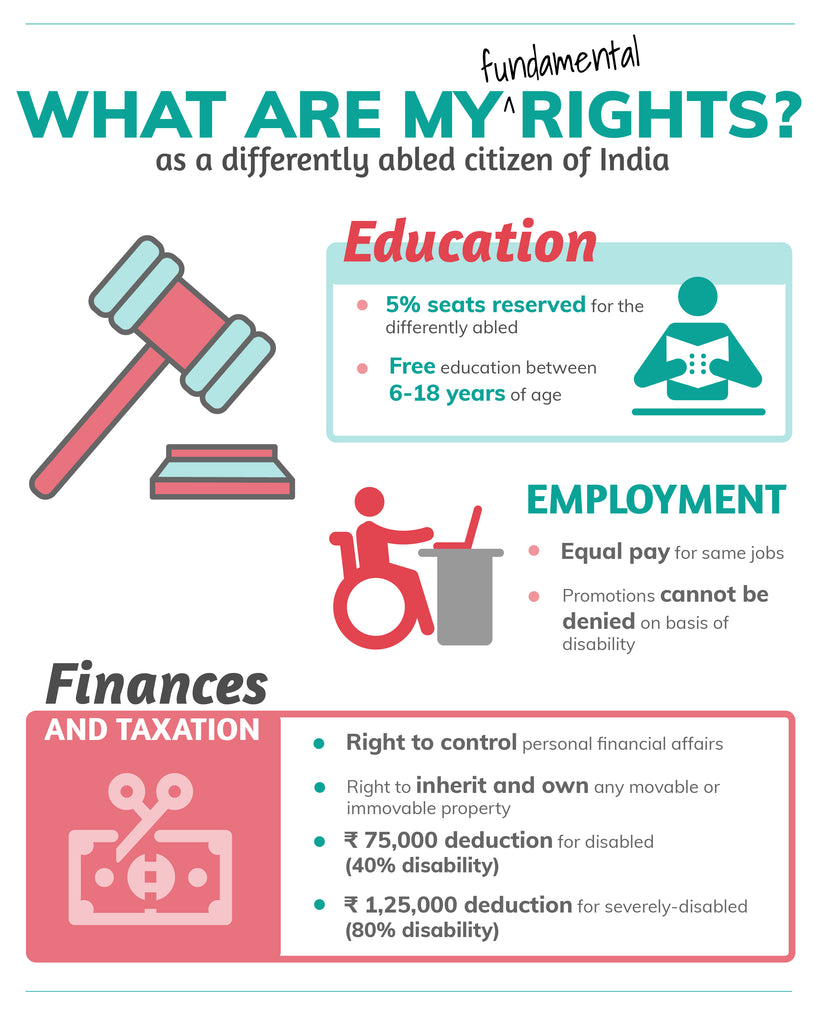Your Shopping Bag is Empty

“According to World Health Organization, physically challenged individuals are four times more likely to report being treated badly and nearly three times more likely to be denied healthcare.”
In India, according to the 2001 census, the physically challenged population was calculated to be 21 million. In 2011, with an increase of 22.4%, it reached to 26.9 million. And it is estimated that almost 45% of the people living with special needs are still illiterate and unaware of their basic rights.
These figures are appalling; and even though they are beyond belief, they are crucially true facts which provide an initial insight into this scenario. Considering these major figures and the impact of the neglect suffered by this section of society, the Government of India enforced "The Rights of Persons with Disability Act" in 2016, replacing the much outdated Persons with Disabilities Act, 1955.
The 2016 Act, in its expanded scope, now recognizes 21 disabilities including:


For the inclusion of this segment into the general population, the act makes it mandatory for government institutions, or those who receive public aid, to reserve 5% of seats for students with benchmark disabilities. Also, 4% of the total number of posts in any government establishment is reserved exclusively for the former.
To eradicate illiteracy and uplift the youngsters struggling with benchmark disabilities, the act provides for free education to such children between the ages of 6-18 years.

Most importantly, a promotion can no longer be denied on the basis of physical discrimination.
It has also been clearly stated that when a person acquires a disability during his service he cannot be laid off. If such circumstances do not allow the employee to operate at the current post, he/she has the right to be shifted to a suitable post with the same pay scale. In cases where a suitable post is unavailable, a supernumerary post shall be awarded till the former is made available, or till the employee attains the age of superannuation.

A lot of specially-abled people who are fighting the narrow mentality and stigma of the society are left unheard due to the lack of support, encouragement, accessible facilities and awareness.
The legal capacity and recognition of any individual is the proof of his/her existence as a social being, and therefore, it becomes of immense importance that one and all, irrespective of their physical or mental condition, have an equal and unbiased right to be represented and heard. Section 13of ‘The Rights of Persons with Disability Act’ gives any Person with Disability (PWD), the right to inherit and own any movable or immovable property, as well as, control personal financial affairs. Where a person is unable to take legal decisions for their own benefit due to some special need, they are entitled to a legal representative/guardian.

It is a fundamental right of every person to have access to all public services irrespective of their physical conditions. Therefore, no restrictions can be inflicted upon any such individual for the enjoyment of public entertainment. It is within the power of any PWD to demand an obstacle-free, built-up environment and transport system which enables mobility with dignity.
People who have a disability certificate are entitled to a concession on the amount paid for train, bus, or flight tickets depending on the provisions of the respective state government. People also have the right to tax concessions on their income if they are differently-abled. Section 80U of the Income Tax Act provides the rate for such concession. Under Section 80DD, a caregiver has the right to claim a tax deduction if any expense is incurred for the medical treatment/rehabilitation/nursing for any PWD in his/her family.
While several acts and policies have been brought up by the government to provide an equal platform to all, it is not only the duty of the authorities to work for the welfare and rights of the differently-abled, but also the responsibility of the individual to be aware of those rights. One must raise an objection when there is discrimination or infringement. One must have the courage to step forward and fight for an equal and dignified position. May we all step forward into a future that holds an equal potential for all, irrespective of race, color, caste or limitations.
By Tanshi Sahu
Guest Author and Student of Law
Bibliography
Right of Disabled in India, Lawfarm | Standards of Accessibility, Vikaspedia | Ministry of Law and Justice, PDF | Income Tax Department, Government of India
Disclaimer: The information in this blog post (“post”) is provided for general informational purposes only. While we have attempted to bring the best-known information to light, no reader of this post should act or refrain from acting on the basis of any information included in, or accessible through, this Post without seeking the appropriate legal or other professional advice. We request that the information contained in this post should not be construed as legal advice from Hey Zindagi Solutions Pvt. Ltd. or the individual author, as it is not intended to be a substitute for legal counsel on any subject matter.
Comments will be approved before showing up.